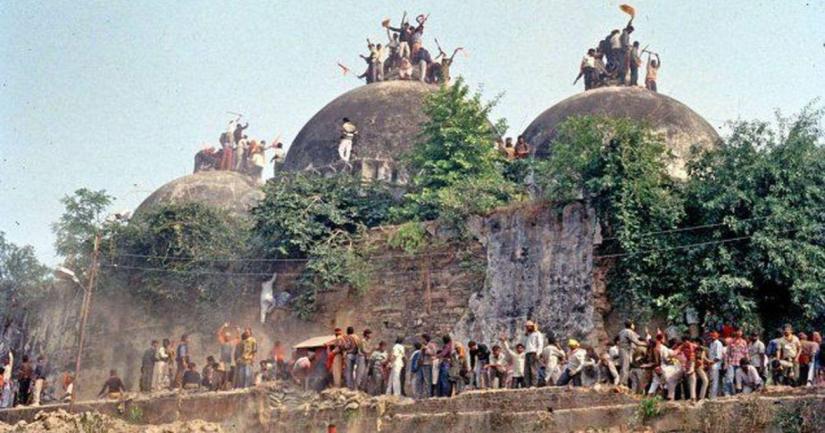 The Indian Supreme Court’s verdict in the Ayodhya matter has settled the title suit in favor of the main Hindu plaintiff, essentially the Vishwa Hindu Parishad. It is clear that there’s much at stake for the country than the ownership of 2.77 acres of land on which a mosque stood for 470 years until it was demolished in an act of political vandalism unparalleled in the modern world.
The Indian Supreme Court’s verdict in the Ayodhya matter has settled the title suit in favor of the main Hindu plaintiff, essentially the Vishwa Hindu Parishad. It is clear that there’s much at stake for the country than the ownership of 2.77 acres of land on which a mosque stood for 470 years until it was demolished in an act of political vandalism unparalleled in the modern world.
Going forward, what does the judgment mean for India? To answer that question we need to understand what Ayodhya is really about. For more than a quarter of a Century Ayodhya has served as a metaphor for the politics of revanchism that combines the deployment of a manufactured mythology around the figure of Lord Ram with mob violence, majoritarianism and a spectacular contempt for the rule of law. The aim of this politics is to upend the Republic with its premise of equality for all citizens and replace it with a system in which India’s religious minorities along with other marginalized sections of the population are forced to live in perpetual insecurity. If India’s democratic institutions had been robust, the demolition of the Babri Masjid on Dec 6, 1992 should have permanently ended this politics instead of merely marking the end of its first phase. Today, that politics has reached a new high watermark presumably, not necessarily the final one! Now the Supreme Court has stepped in. Armed with the court’s imprimatur the Sangh Parivar will do its best to erase the taint of mob justice which has been the strength but also the weakness of its movement.
If India’s democratic institutions had been robust, the demolition of the Babri Masjid on Dec 6, 1992 should have permanently ended this politics instead of merely marking the end of its first phase. Today, that politics has reached a new high watermark presumably, not necessarily the final one! Now the Supreme Court has stepped in. Armed with the court’s imprimatur the Sangh Parivar will do its best to erase the taint of mob justice which has been the strength but also the weakness of its movement.
We can pretend all we like that the Supreme Court was only adjudicating a civil dispute. In reality, there was nothing civil about what a judge on the bench had called one of the most important cases of the world. The dispute can’t be divorced from the politics which has driven it. The title suit in the Babri Masjid matter has been going on in one form or the other since 1949 mainly in the local court of Faizabad where Ayodhya is located. It took on national salience in the 1980s, thanks to the cynical politics of Lal Krishna Advani, Atal Bihari Vajpayee, Rajiv Gandhi and of course now forgotten villains like Vir Bahadur Singh and Arun Nehru. BJP leaders conspired to demolish the mosque on December 6th, 1992 and a Congress Prime Minister Naroshima Rao allowed them to get away with the crime.
Legal analysts had expected the five-judge bench to deliver a nuanced verdict that would not lend itself to shrill triumphalism by either side to the dispute. The clarity of the Court’s ruling in favor of the pro temple lobby will boost the morale of the Sangh Parivar. The fact that the ruling party and hence the government is committed to the construction of the Ram Temple at the site of the Babri Masjid means the path is now clear for speedy implementation of the project.
The fact that the court has cited evidence of Hindus worshipping at the disputing site as a reason for handing over possession could also open a can of worms for India. It should be readily apparent that this logic can also be applied to other mosques which the Hindutva organizations might have an eye on. Once the Ayodhya temple has been milked of all political mileage, the Sangh could be very well up the ante elsewhere. None of this should surprise us since we were never dealing with a civil dispute between litigants operating on a level playing field but rather a naked power play ---- one in which the political agenda of the so-called cultural organization the Rastriya Swayamsevak Sangh (RSS) is not hidden and the biases of the Uttar Pradesh and central governments are on open display. That’s also why the Supreme Court’s insistence on mediation was so misplaced.
As stated earlier that the Ayodhya case really is one of the most complex cases in the world. It is so because the violence associated with it. Can this case really be settled then without punishing the leaders responsible for that violence? The five-judge bench represented an impressive array of judicial wisdom; sadly their Judgment offers no pointers on this fundamental question.
Md Sharif Hasan is a faculty at the Department of International Relations, University of Rajshahi.
 Opinion
Opinion
30909 hour(s) 12 minute(s) ago ;
Afternoon 04:06 ; Friday ; Apr 26, 2024
Every final judgment not necessarily right or just
Send
Md Sharif Hasan
Published : 17:58, Nov 15, 2019 | Updated : 18:02, Nov 15, 2019
Published : 17:58, Nov 15, 2019 | Updated : 18:02, Nov 15, 2019
0 ...0 ...
/ab/hb/
Topics: Md. Sharif Hasan
***The opinions, beliefs and viewpoints expressed in this article are those of the author and do not reflect the opinions and views of Bangla Tribune.
- KOICA donates medical supplies to BSMMU
- 5 more flights to take back British nationals to London
- Covid19: Rajarbagh, Mohammadpur worst affected
- Momen joins UN solidarity song over COVID-19 combat
- Covid-19: OIC to hold special meeting
- WFP begins food distribution in Cox’s Bazar
- WFP begins food distribution in Cox’s Bazar
- 290 return home to Australia
- Third charter flight for US citizens to return home
- Dhaka proposes to postpone D8 Summit
Unauthorized use of news, image, information, etc published by Bangla Tribune is punishable by copyright law. Appropriate legal steps will be taken by the management against any person or body that infringes those laws.
Bangla Tribune is one of the most revered online newspapers in Bangladesh, due to its reputation of neutral coverage and incisive analysis.
F R Tower, 8/C Panthapath, Shukrabad, Dhaka-1207 | Phone: 58151324; 58151326, Fax: 58151329 | Mob: 01730794527, 01730794528


